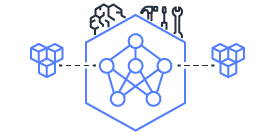This document is relevant for: Inf2, Trn1, Trn2, Trn3
PyTorch NeuronX Lazy and Asynchronous Loading API#
The torch_neuronx.lazy_load() and torch_neuronx.async_load() Python APIs allow
for more fine-grained control of loading a model onto the Neuron cores. They are designed to
enable different load behaviours (i.e. lazy or asynchronous loading) that, in certain cases,
can speed up the load time. Both APIs take as input a ScriptModule model
created by PyTorch NeuronX Tracing API for Inference. They should be called immediately after torch_neuronx.trace()
returns, before saving the model via torch.jit.save()
- torch_neuronx.lazy_load(trace, enable_lazy_load=True)#
Enables(or disables) lazy load behaviour on the traced Neuron ScriptModule
trace. By default, lazy load behaviour is disabled, so this API must be called immediately aftertorch_neuronx.trace()returns if lazy load behaviour is desired.In this context, lazy loading means that calling
torch.jit.loadwill not immediately load the model onto the Neuron core. Instead, the model will be loaded onto the Neuron core at a later time, either via a call to PyTorch NeuronX DataParallel API, or automatically when the model’sforwardmethod executes.There are several scenarios where lazy loading is useful. For instance, if one wants to use the DataParallel API to load the model onto multiple Neuron cores, typically one would first call
torch.jit.loadto load the saved model from disk, and then callDataParallelon the object returned bytorch.jit.load. Doing this will cause redundant loading, because callingtorch.jit.loadfirst will by default load the model onto one Neuron core, while callingDataParallelnext will first unload the model from the Neuron core, and then load again according to user-specifieddevice_ids. This redundant load is avoided if one enables lazy loading by callingtorch_neuronx.lazy_loadprior to saving the model. This way,torch.jit.loadwill not load the model onto the Neuron core, soDataParallelcan directly load the model onto the desired cores.Required Arguments
- Parameters:
trace (ScriptModule) – Model created by the PyTorch NeuronX Tracing API for Inference, for which lazy loading is to be enabled.
Optional Arguments
- Parameters:
enable_lazy_load (bool) – Whether to enable lazy loading, defaults to True.
Simple example usage:
>>> neuron_model = torch_neuronx.trace(model, inputs) >>> torch_neuronx.lazy_load(neuron_model) >>> torch.jit.save(neuron_model, "my_model")
Then some time later:
>>> neuron_model = torch.jit.load("my_model") # neuron_model will not be loaded onto the Neuron core until it is run or it is passed to DataParallel
- torch_neuronx.async_load(trace, enable_async_load=True)#
Enables(or disables) asynchronous load behaviour on the traced Neuron ScriptModule
trace.By default, loading onto the Neuron core is a synchronous, blocking operation. This API can be called immediately after
torch_neuronx.trace()returns in order to make loading this model onto the Neuron core a non-blocking operation. This means that when a load onto the Neuron core is triggered, either through a call totorch.jit.loadorDataParallel, a new thread is launched to perform the load, while the calling function will immediately return. The load will proceed asynchronously in the background, and only when it finishes will the model successfully execute. If the model’sforwardmethod is invoked before the asynchronus load finishes,forwardwill wait until the load completes before executing the model.This API is useful when one wants to load multiple models onto the Neuron core in parallel. It allows multiple calls to load different models to execute concurrently on different threads, which can significantly reduce the total load time when there are multiple CPU cores on the host. It is especially useful in cases where a single model pipeline has several compiled Neuron models. In this case, one can enable asynchronous load on each Neuron model and load all of them in parallel.
Note that this API differs from
torch_neuronx.lazy_load(). Lazy loading will only delay the load onto the Neuron core from whentorch.jit.loadis called to some later time, but when the load does occur, it is still a synchronous, blocking operation. Asynchronous loading will make the load an asynchronous, non-blocking operation, but it does not delay when the load starts, meaning that callingtorch.jit.loadwill still start the load, but the load will proceed asynchronously in the background.Required Arguments
- Parameters:
trace (ScriptModule) – Model created by the PyTorch NeuronX Tracing API for Inference, for which asynchronous loading is to be enabled.
Optional Arguments
- Parameters:
enable_async_load (bool) – Whether to enable asynchronous loading, defaults to True.
Simple example usage:
>>> neuron_model1 = torch_neuronx.trace(model1, inputs1) >>> torch_neuronx.async_load(neuron_model1) >>> torch.jit.save(neuron_model1, "my_model1")
>>> neuron_model2 = torch_neuronx.trace(model2, inputs2) >>> torch_neuronx.async_load(neuron_model2) >>> torch.jit.save(neuron_model2, "my_model2")
Then some time later:
>>> neuron_model1 = torch.jit.load("my_model1") # neuron_model1 will start loading onto the Neuron core immediately, but the load will occur in a separate thread in the background. >>> neuron_model2 = torch.jit.load("my_model2") # neuron_model2 will start loading onto the Neuron core immediately, but the load will occur in a separate thread in the background.
Both neuron_model1 and neuron_model2 will load concurrently.
>>> output1 = neuron_model1(input1) # This call will block until the asynchronous load launched above finishes. >>> output2 = neuron_model2(input2) # This call will block until the asynchronous load launched above finishes.
Using torch_neuronx.lazy_load() and torch_neuronx.async_load() Together#
You can also enable lazy load and asynchronous load together for the same model.
To do so, simply call each API independently before saving the model with torch.jit.save:
>>> neuron_model = torch_neuronx.trace(model, inputs)
>>> torch_neuronx.lazy_load(neuron_model)
>>> torch_neuronx.async_load(neuron_model)
>>> torch.jit.save(neuron_model, "my_model")
This will both delay loading the model onto the Neuron core, and make the load asynchronous.
For another example usage, please refer to the Github sample we provide for running inference on HuggingFace Stable Diffusion 2.1,
where we use both lazy_load and async_load to speed up the total load time of the four Neuron models that make
up that pipeline.
This document is relevant for: Inf2, Trn1, Trn2, Trn3
